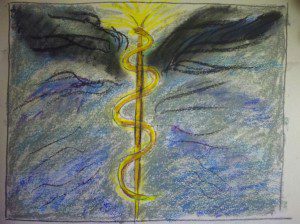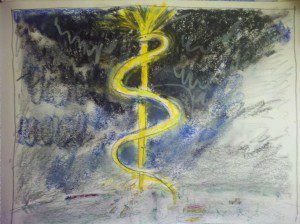
You are called to the temple of healing, often by a dream. You may be driven by desperation: you are suffering in body or mind, and you have found nothing that relieves your pain or heals your symptoms. So you embark on your journey to one of the precincts of healing. There are at least 200 in the Mediterranean world, including the great temples at Epidaurus and Pergamon, and the complex the Romans built on a boat-shaped island in the Tiber when they decided to import the Greek god in the form of a statue that was his “breathing likeness”.
Unless you happen to live close to one of the temples, or are rich and powerful enough to travel with a strong force of armed bodyguards, your journey will be dangerous. You will have to survive brigands, and wild beasts, and perhaps the perils of a crossing by water. The hazards of the journey may be the first step towards your healing. You have left the familiar grooves of your life. You have a chance of becoming the protagonist, rather than a victim or an extra, in your own life drama.
The boundary stones of the precinct of healing alert you that you are about to enter sacred space. Over the outer gate, you may find an inscription cautioning you that only those with a “clean mind” may enter “the fragrant temple”. You are being challenged to open to the experience of metanoia, the changing of the mind. You may not yet grasp that unless you can drop your old mindset and your past history as a snake sheds its skin, you will never truly enter the temple. You will be helped to learn this, and to slough off the old skin, through a period of preparation that starts with ritual cleansing.
You are bathed in the waters of a sacred spring. Perhaps you are immersed in the sea, for the deep cleansing of salt water. “The god delights most of all if what is most godlike within ourselves is clean.”. You put on fresh clothes; the simple white garment of a neophyte – someone who does not kid themselves that they have the answers – would be best.
You make your offerings to the healing god. Food is always welcome, especially food the snakes and dogs of the temple precinct would enjoy. The dogs will be panting and padding around you hopefully if you have brought meat, or perhaps a trussed chicken or rooster to be sacrificed, as Socrates sent to Asklepios.
You’ll be given lots of time to look around, and this part of the preparation is vitally important, because it is going to shift your understanding of what is possible. One of the first things you notice is that you have entered a orchard of body parts. Replicas of eyes and kidneys, ears and intestines, hang from walls and ceilings. These votive offerings testify to healings that have already taken place. If you can read, you can inspect fuller testimonials, in the inscriptions carved on stelai set up in the courtyard.
Some of the narrative testimonials from the ancient temples of Asklepios are wonderfully personal. The god appears to a sick person like a doctor with a kindly bedside manner and an awesome presence you just have to trust. Sometimes he begins, as a regular physician might do in a society where there is no standard pay scale, by discussing the price for his services. “What will you pay in order to be healed?” he asks a young man who is in agony with the stone. “Ten dice,” the youth proposes, in the dream conversation. The god is entertained by the gamble this implies. In the morning, the young man is cured, and we can safely assume that he added ten dice to the god’s endowment.
In some of the older testimonials, the god performs oneiric surgery. He rips open your chest or your abdomen, rinses and heals your organs, and sews you up, whole and renewed. He cuts your eyeball and your sight is restored.
He tells you to get up and – even if you were previously paralyzed and had to come here on a litter – you stand up and you walk, and you are healed. He corrects chronic conditions like infertility, blindness, lameness. People come to him with problems for which there is no medical cure available. A woman who was barren for five years gives birth to a baby that immediately gets on its feet and goes to a fountain.
In the later inscriptions, his methods are gentler, often conversational. “I struck up a conversation with the god,” one visitor testified. The god proposes lifestyle changes, and he offers prescriptions. Some of these are plain common sense: eat more vegetables if you are constipated, gargle for a sore throat. [ Sometimes his remedies are very earthy indeed: get some exercise, get in the water (or stay out of it), change your diet, purge.
Do you really need to talk to a god to get messages like these?
Ah, but there is more, and it comes with shivers. You are in a place where prayer has been valid. That is what all those votive organs are telling you. You are here to meet a healer who is kinder and wiser than any other physician. He was a human being once, so the story goes, born of a god and a mortal woman. He was mentored by Chiron the centaur, the model of the wounded healer, who bleeds from an injury he cannot cure. In his great compassion, Asklepios brings the dead back to life, incurring the wrath of Zeus, who strikes him down with a thunderbolt. In death, he is transfigured. Now he appears in dreams and especially in half-dreams, in that intermediate state in which you are not sure whether you are awake or asleep but know for certain that what is going on is intensely real.
You study the image of the god in the outer temple. The statue is made of gold and ivory. The god is well-muscled and larger than human size. He sits enthroned, with a dog at his feet. He is inseparable from his dogs; it’s said that in infancy, he was nourished by a dog. If you have a wound or a rash, and are very lucky, right now one of the temple dogs might come to you and heal you with his friendly slobber.
The god holds his hand over the head of an enormous snake. He has raised the serpent energy, yet manages to control and contain it. As you contemplate what the snake means in this mode of healing, your shivers come stronger, not least because you know that you’ll spend tonight in an incubation chamber full of snakes. What part will the snake play in your healing? You sense its connection with the earth, and the gifts and challenges of the fertile dark. You can’t miss the raw sexual vitality it suggests. Do you know now – have the god’s helpers told you? – that you are here to claim the snake’s power to shed your old skin?
Your emotions are now fully engaged. Hope and fear struggle within you, like writhing snakes. You may be taken to the nearby theater, to sit on a seat cut into the living rock of the hillside, to let your emotions be purged through the catharsis of deep tragedy. But you won’t be left in the tragic mode. After, you’ll blush and honk and chortle as bawdy comics claim the stage, one of them flapping a fake phallus as long as his body.
With the lighting of candles, you wait to enter the abaton, the “forbidden dormitory” of the god – forbidden to those who have not undergone the preparation you have now made.
You join in hymns and invocations to wake up the god and engage his attention.
“Egreo Paian Asklepios!” “Wake, Asklepios the Healer!”
Your expectations are running high. You join in the voices that call in the power of healing: “Healer of all, come blessed one!”
You feel the shift in the night air as the chorus of voices responds, “Megas o Asklepios!” “Great is Asklepios!”
You are ready now for the sacred night, and the coming of the sacred healer.
We will open the Temple of Dream Healing at a lovely private retreat center near Seattle from July 16-20.

